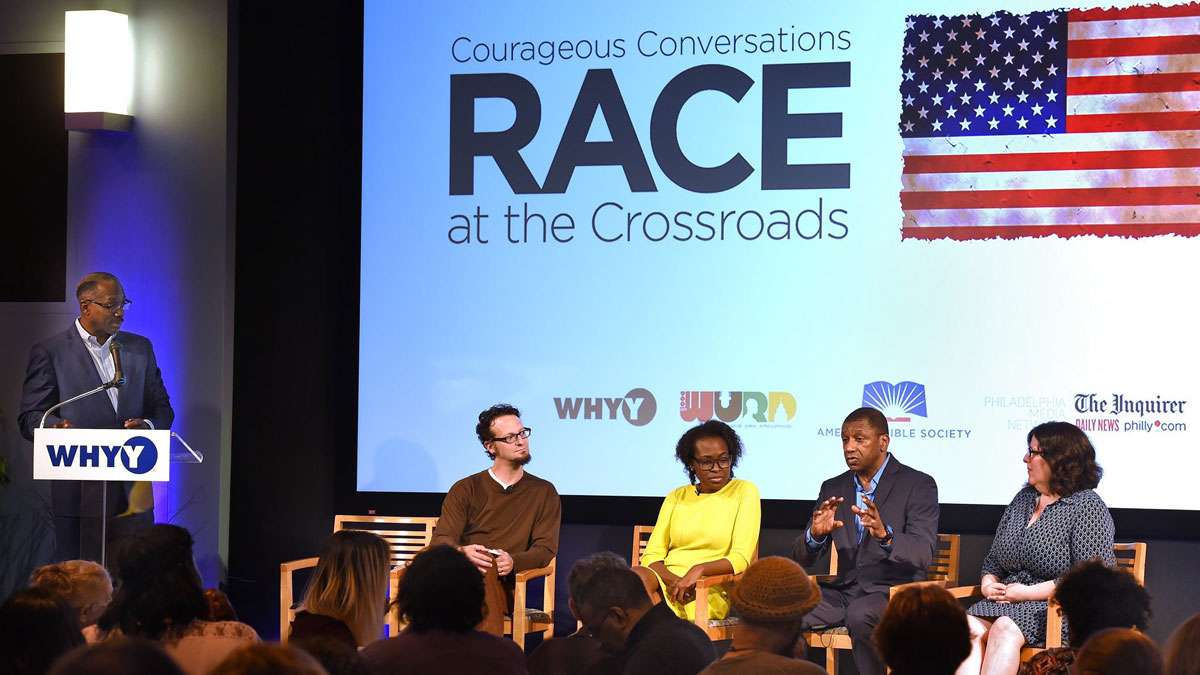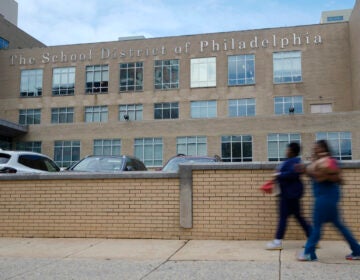Courageous Conversations: sharing stories about race and pledging to practice more
Is there a better way people can talk about race in America? Nearly 175 people showed up to take up that challenge at an event held Monday night at WHYY that featured a panel and small breakout groups.
WHYY hosted “Courageous Conversations: Race at the Crossroads,” which asked the question, “What do we lose when we don’t talk about race and how could our lives improve if we did?”
At one of the round tables that filled the room, Chris Weidner and Russell Morris sat next to each other.
Weidner, a white man from nearly all-white Gilbertsville in Montgomery County, says he attended because he says he’s “slowly waking up to white privilege.”
During the small discussion portion, he relayed a story about waiting for the contractor at his daughter’s Chestnut Hill home.
“So a black guy comes up to the door in a t-shirt, and the first thought that comes into my heart and my mind is ‘This guy is panhandling here,'” he said about the contractor. “I don’t know where that came from…And I felt totally humiliated and ashamed.”
Russell Morris, an African-American man from West Philadelphia and adjunct professor of education at Penn, responded.
“I would hazard a guess to say you, like all the rest of us, were born into it,” he said. “What you were given at birth and throughout your upbringing was the consolidation of a lot of what biases, opinions, beliefs that your people — and when I say your people, I mean your family, your community — what they learned, what they were born into and then what they passed on to you,” Morris said.
At the end of the evening, the pair exchanged email addresses.
“This issue of race is a lot like the air we breathe. We just all are in it, and it’s just a matter of how we choose to be aware of it and what we do with it,” Morris said.
Believing ‘the lion’s story’
Rev. Dan Williams, senior pastor of New Life in Christ Fellowship in Coatesville, moderated the event and asked pointed questions such as, “How do we begin if white people don’t believe the real-life experiences of black people?”
Panelist Errin Whack, an urban affairs reporter for the Associated Press, says one starting point is changing attitudes and perspectives, particularly white people believing the life experiences of black people.
“It starts with being open to other people’s experiences that are not necessarily similar to yours, right?” she said. “Yes, you may be a white person who has never had a negative exchange with a police officer…And so the idea that that would not be true for somebody just because they are not white may be something that is completely alien.”
She mentioned that while covering the disparities in policing for the past several years, she noticed the proof that was required in order for black people to believed, and that until the Department of Justice released documentation, many of those stories were not validated.
Panelist Howard Stevenson, a professor of urban education and Africana studies at the University of Pennsylvania, says disbelieving someone’s experiences is a psychological strategy to keep power.
“In a sense, I think it’s a form of dehumanization. There’s a proverb that we use in our work: ‘The lion’s story will never be known as long as the hunter is the one to tell it.’ It means that we hope that people won’t discount other people or their stories.”
Stevenson says he worries that what makes it hard to have a conversation is the same thing people are not equipped to deal with — fear, the fear of difference and fear of brown and black people.
“The only way I know about how to do that when we’re talking to educators and police is to say, ‘I want you to see my child like you see your child,’ because then I know you won’t shoot your child. I know you won’t expel your child the first time they piss you off. I know you won’t see your child like a snake or a monster.”
He mentioned preschool as the grade when children are most likely to be expelled, and that black boys are far more likely to be expelled than any other group.
Majority becoming the minority
Marybeth Gasman, director of Penn’s Minority Serving Institutions, talked about her hope that the Confederate monuments that are being removed will be preserved so as not forget the history.
“I would like us to put them in a museum that helps people to understand what American racism is,” she said. “I’d like all of those things in there, curated in a way that helps us to understand what has happened, who was oppressed and how this all happened because I don’t want to see us repeat things.”
She mentioned altered history textbooks and comments made by President Donald Trump and Cabinet members contribute to the whitewashing of American history.
“What I see right now is a slow wiping away of our past and people trying to get us to believe that these things didn’t happen.”
Panelist Shane Claiborne, a Christian author and activist, says there’s a need to create spaces where people can listen to each other.
“I think for white folks, we’ve got to be in a place where we’re the minority more often,” he said. “It won’t be long before we aren’t going to have a choice, so we might as well practice a little bit. We’re used to being the dominant space, and so I think we’ve got to deliberately seek to learn from black leadership and other folks of color leadership.”
Stevenson, executive director of Penn’s Racial Empowerment Collaborative that’s designed to promote racial literacy, said one reason people aren’t good at having conversations around race is they don’t have them often enough and the need to practice.
Gasman, who talked about her early exposure to racism, also made a call to action to take care of each other, in particular other people’s children and parents.
“We’re just perpetuating the racist and classist systems that continue to keep so many people down,” she said. “I think we all need to step it up. We all need to sacrifice a bit … that’s how you get equity. You’ve got to give in, and sometimes you’ve got to give something up.”
The event is the first of four in the Courageous Conversations series that is being hosted by WHYY, WURD, Philadelphia Media Network, and the American Bible Society.
WHYY is your source for fact-based, in-depth journalism and information. As a nonprofit organization, we rely on financial support from readers like you. Please give today.










